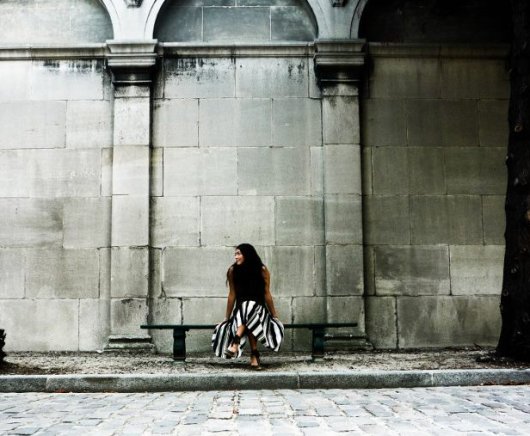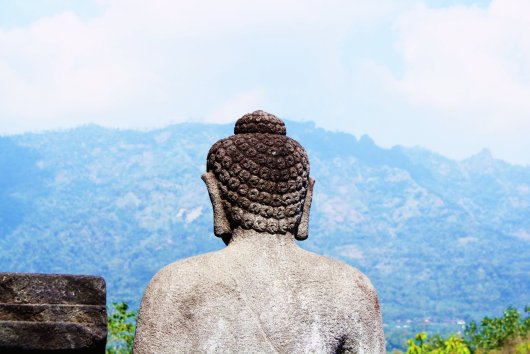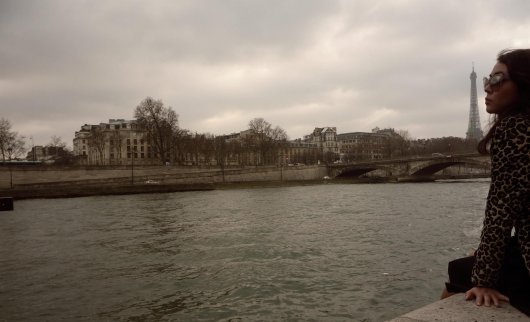 ROMANCE
ROMANCE In Which We Tuck The Blossom Behind Our Ear
 Thursday, May 1, 2014 at 11:37AM
Thursday, May 1, 2014 at 11:37AM 
Love in the Mountains
by ARIANA ROBERTS
“Yehpeudah,” I tell her. She thanks me in Korean, and our guide proudly says she’s marrying the richest man in the village. He was married before, and has a daughter the same age as her. There were lots of young boys vying for her hand, but wasn’t she good for making a smart match? The bride whispers to our guide. “She wants to know what color hanbok you had when you marry.”
“I’ve never been married.”
“Why fat boy and brown girl talk about your wedding? Not that fat boy,” Mrs. Yoon says, noticing me scan the tour group. “The one with glasses.”
“I was supposed to be married last year.” Supposedly the bride doesn’t speak English, but she stops hiding behind Mrs. Yoon and takes a step closer to me.
“Why didn’t you?”
“If I’d gotten married, I wouldn’t have been able to come here.”

“Then you right. This is the greatest and most beautiful country on earth. Was he Korean?”
“No, Italian. But he’s from Australia. My family wants me to marry a Korean doctor.”
Mrs. Yoon shakes her head. “No matter if Korean, Italian, Australian. You find the person you can eat with every day. If he doesn’t make you lose your dinner, then he the right one! You have to find person you love. But not an American.” I throw my head down and laugh because I think she’s joking. She is not.
“The last Americans I see, boy and girl, they marry. They say, ‘Tie the knot.’ But knot can be untied! Husband can never be untied! American movies, they untie and retie, no deal big! Wait some. Don’t worry about husband until older. When you get to be 21, 22, we worry.”
“I’m 23,” I tell her, and Mrs. Yoon looks horrified, as if I’ve just plucked her heart out with chopsticks. She throws her hands in the air. “Maybe I find you a husband here. You pretty sometimes. But you need a lot of fixing.” She walks off muttering about the heavy burden I’ve placed on her. The bride is standing so close to me now. Her eyes are wet, but she’s smiling. “You are courageous,” she whispers in perfect English. She squeezes my hand, lifts up her skirts, and runs towards the pebek, straight to the husband she can never untie.
 the author in front of a temple in Kaesong
the author in front of a temple in Kaesong
We are outside Kaesong now, and the highway cuts into a steep hill overlooking mountains. This must be the place my grandpa talked about. “What did he say?” General Shin asks. His voice is so sharp, so startling, that my face is red, my chest is heaving, and the hair on my arms stands straight up. My lips didn’t move. I didn’t say that out loud, I’m sure of it.
“He said King Kongmin is buried here. His father came before the Japanese raid — I have a sketch he made from memory — and saw the Mongol treasures, from Persia, Russia, Constantinople, Egypt. My grandfather went after everything was destroyed. The raiders used dynamite on the tomb’s entrance. He said there’s a great love story in these mountains.”
“Tell story.”
“I don’t know it.”
“Why don’t you know?”
“He said he’d tell me when I was older. He died before I was.” I try clenching my jaw to stop my chattering teeth, but they’re beyond control.
“Stop the bus,” General Shin orders the driver. He steps off to make a phone call. A few minutes later, he reappears. “Come now,” he tells me.
 the author in chongjin
the author in chongjin
I obediently follow him around the bend, out of sight from the bus. I can’t pray, and I’m too panicked to run. Eventually stone muninseok and tigers surround me. Yangsok guard two moss-covered granite mounds. General Shin pets the sheep, as tenderly as if they were flesh and wool.
“Americans aren’t allowed here anymore,” General Shin says. “But you are not really American, are you? It’s where you were born, not what you are.” He cups my chin with his hand. “You never say, ‘I’m American’ or ‘I’m Korean.’ Not like the others. First night, they all say what they are. It’s where they’re from. I’m Belgian, Dutch, English! You say only, ‘I’m Ariana.’ Do you know what you are? You don’t, because you’ve never been told. Nobody tells you in America. That’s why Americans are lost.
“Gongmin was captured many years, forced to serve Empress Ki. When he a boy, he vow to marry Noguk. The Yuan laughed! She was princess, he was hostage! But he painted her, and she loved him. She called him kunmang, because his painting more perfect than nature. Gongmin grew strong, crossed the Yalu, freed the Goryeo. He married the princess. For thirteen years, one never left the other’s side. Noguk became pregnant and died with child. Gongmin’s tears were as blood. He could not bury her seven years. He could not rule.”
 the tomb outside Kaesong
the tomb outside Kaesong
“Gongmin called all mathematics and stargazers in the land to find his love a resting place. As each failed to please, he killed each. One of the Jung Kam Lok promised good pung su. Gongmin would give him all he desired if succeed, but if fail, certain death. Gongmin climbed this hill alone. He told the muninseok that if he waved his scarf, they should kill Jung Kam Lok.”
“It’s perfect,” I say breathlessly. Mongnan and mokran bloom in these hills. The first apricot trees sprouted here. “The geomancer must have been so relieved.”
“No interrupt,” General Shin scolds, wresting a magnolia blossom from my hand. He tries to put it back in the tree, and, failing that, flings it at me. “Climbing the mountain made Gongmin weary. He wiped his head with the scarf and looked over the land. It was delight. Gongmin descended the mountain to congratulate Jung Kam Lok. He dead. The muninseok saw the scarf and killed without hesitation. That how the mountain get name.”
One mound for Noguk, one for Kongmin. They fought the Turbans together. Rain soaked their garments, which froze to their bodies in the cold; they burned the queen’s carriage to warm themselves and traveled on skeletal horses instead of steeds. Koryo writers say the sound of wailing moved heaven and earth as Yi’s forces advanced towards the capital. All around them, children and mothers abandoned one another, but nothing separated these two, not flood or fire or one million warriors camping around Kaegyong. Scrawled on Noguk’s tomb is calligraphy, the most delicate and feminine script I’ve ever seen. Later I’ll learn that this was probably the work of Kongmin, along with various rock paintings and murals scattered throughout the countryside. It says:
“Throughout the land, wind-blown dusts exceed years past. What quarter was not in tumult? If our dynasty stands firm like a rock, protecting our livelihoods, heaven will allow these people, to sleep in peace. Death has come upon everyone unaware, haggard from laboring, a touch of frustration. They change with times, the affairs of men. Could they worry that there is nowhere they can sleep in peace?”
I tuck the blossom behind my ear. Over a hundred years ago, Japanese soldiers blasted open the tomb chamber. It is believed they carried everything off to Japan — relics Temujin himself held — but nothing like it has surfaced anywhere since. “Why aren’t Americans allowed here anymore?” General Shin has been fiddling with a shrub, but now he swings around with such suddenness that I’m mentally slapping myself on the forehead for asking. “I don’t mean to be disrespectful. It’s just so beautiful. Don’t you want the world to know how wonderful this all is?”
General Shin smiles for the first time all week. “Ariana,” he says, pronouncing the ‘r’ as ‘l,’ “Americans not allowed because Americans don’t understand love.”
Ariana Roberts is the senior contributor to This Recording. She is a writer living in Cleveland. She last wrote in these pages about the matchmaker.
Photographs by the author.

"Don't Leave" - Seven Lions ft. Ellie Goulding (mp3)
"Keep It Close" - Seven Lions ft. Kerli (mp3)













































